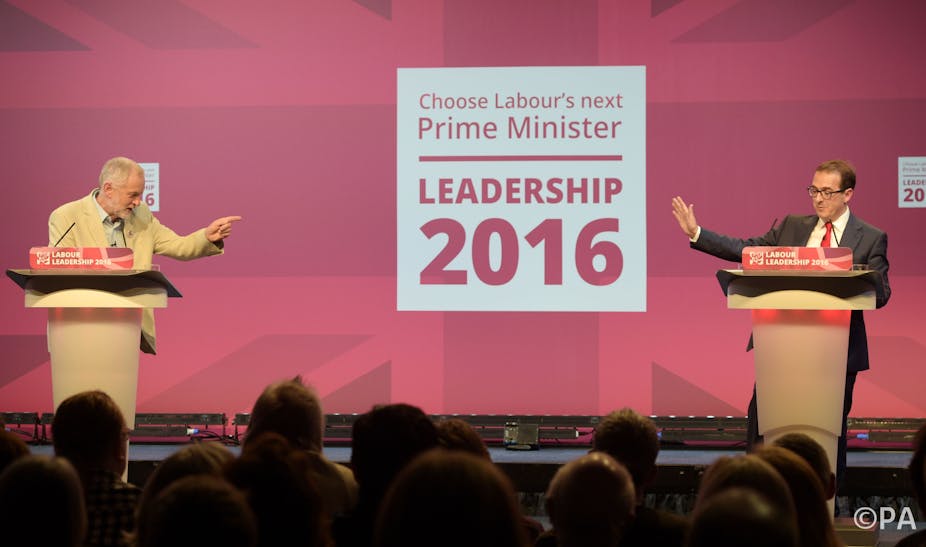Trade unions constitute a sizeable influence in the Labour Party. This goes back to the party’s founding, which grew out of the trade union movement. Continual changes to the party’s governance by its last four leaders have attempted to reduce this influence, but, as Jeremy Corbyn’s enduring popularity among party members shows, unions – and the left – are now more dominant in Labour than at any time in the last generation.
Already, four unions (Aslef, CWU, TSSA and UCATT) have declared for Corbyn against his challenger, Owen Smith (who so far has the backing of two unions, Community and the Musician’s Union. Other unions, including the largest two unions, Unite and UNISON as well as the FBU and BFAWU, are expected to back Corbyn in the weeks ahead. So most unions’ goal will be to get Corbyn re-elected as party leader on September 24 and help him become elected as a Labour prime minister in the next general election.
So what, in practice, does union support mean? For Corbyn, the mere formality of individual union backing is important. Not to have this would be seen as a startling rebuke, given that he is a man of the left, that unions have long wanted the politics that he espouses, and that he received such backing from most affiliated unions last time (and a few unaffiliated, but important, unions like the RMT, and the then, FBU).
But beyond this, the situation is more complex. Union support does not now readily translate into guaranteed votes for their chosen candidates. Ed Miliband’s reforms abolished the electoral college (where affiliated unions held one third of the votes) for electing the leader and meant that unions could no longer affiliate members en masse. Now union members wishing to be affiliated party members have to individually and explicitly opt in to membership.

This reform saw the number of union affiliated members fall drastically but that does not mean that unions have lost their influence in Labour. As business supporters have deserted Labour, the party has become more dependent upon union financial donations, and especially from the biggest union, Unite. (Milibands’s reforms also created the new category of registered supporter, allowing those paying £3 and supporting Labour policies, to have a vote in electing the party leader.)
Indeed, individual unions, whether affiliated or not, can still provide funding, resources and activists for Corbyn’s leadership campaign. This ultimately means hard cash donations in order to hire meeting venues and staff, and pay for transport; facilitating access so that campaign material gets to members’ email and home addresses; as well as phonebanks to call members and activists to pound the streets.
Shifting pattern of support
The key question is then what impact does this have: will individual and affiliated members vote; and will individual members and affiliated members – as well as registered supporters – be swayed by what their unions tells them?
The evidence from the 2010 Labour leadership contest suggested that the vast majority of affiliated members did not vote. Of those that did, many did not vote the way their unions suggested they should, with not all affiliated unions supporting Miliband. The more left wings unions supported Diane Abbott.
But the 2015 leadership contest, conducted under the new rules and with a clearly emerging shift to the left, exhibited a different pattern. Overall turnout was up from 71% to 76% and the electorate was vastly enlarged. Individual members and registered supporters now vastly outnumbered affiliated members (that is, most of the union members eligible to vote).
If the same pattern is followed in 2016, the greatest help unions can give Corbyn will be to provide the resources not to target their own affiliated members but rather those of individual members and registered supporters (who may or may not be members of affiliated unions), given how plentiful individual membership and registered support now are in contrast to the shrivelled number of affiliated members.
Given that Corbyn is likely to win, the battle to advance union influence in his project for a radical left politics will then enter a new stage after the result is announced on September 24. He will need not only continuing union support to round on his critics but also union help – where unions sponsor a majority of Labour MPs – to move against his opposition in the Parliamentary Labour Party. In other words, unions will need to organise their party activists to help deselect the mutinous MPs as prospective parliamentary candidates and put in their place “Corbynistas”.
More than this though, a critical and wide-ranging battle needs to be fought. This is to speak to the wider electorate (including the 7m union members) and convince them of Corbyn’s case as a Labour prime minister in waiting that is worth voting for. In the words of left-wing singer-songwriter, Billy Bragg, unions need to do much more than “be active with the activists” and “reach to the converted”. If they want the “Great Leap Forward”, they need to recognise the revolution they seek is much more than just “an activists’ T-shirt away”.

